#coincidentia oppositorum
Text
Hegel's overriding impulse was to comprehend all dimensions of existence as dialectically integrated in one unitary whole. In Hegel's view, all human thought and all reality is pervaded by contradiction, which alone makes possible the development of higher states of consciousness and higher states of being. Each phase of being contains within itself a self-contradiction, and it is this that serves as the motor of its movement to a higher and more complete phase. Through a continuing dialectical process of opposition and synthesis, the world is always in the process of completing itself. Whereas for most of the history of Western philosophy from Aristotle onward, the defining essence of opposites was that they were logically contradictory and mutually exclusive, for Hegel all opposites are logically necessary and mutually implicated elements in a larger truth. Truth is thus radically paradoxical.
Richard Tarnas, The Passion of the Western Mind: Understanding the Ideas that Have Shaped Our World View
#quote#Richard Tarnas#Tarnas#Hegel#Aristotle#coincidentia oppositorum#coincidence of opposites#union of opposites#truth#philosophy#Georg Wilhelm Friedrich Hegel#Western philosophy#Western Mind#thinking#psychology#mind#paradox
165 notes
·
View notes
Text

Burleigh Beach Australia
* * * *
“It was lunar symbolism that enabled man to relate and connect such heterogeneous things as: birth, becoming, death, and ressurection; the waters, plants, woman, fecundity, and immortality; the cosmic darkness, prenatal existence, and life after death, followed by the rebirth of the lunar type ("light coming out of darkness"); weaving, the symbol of the "thread of life," fate, temporality, and death; and yet others. In general most of the ideas of cycle, dualism, polarity, opposition, conflict, but also of reconciliation of contraries, of coincidentia oppositorum, were either discovered or clarified by virtue of lunar symbolism. We may even speak of a metaphysics of the moon, in the sense of a consistent system of "truths" relating to the mode of being peculiar to living creatures, to everything in the cosmos that shares in life, that is, in becoming, growth and waning, death and ressurrection.”
― Mircea Eliade, The Sacred and the Profane: The Nature of Religion
8 notes
·
View notes
Text
La naturaleza del lenguaje es la tergiversación, el ocultamiento, la distorsión. La consigna, por eso, es doble: en la vida, tratar de mantenerse al margen del mundo que no es sino palabras envilecidas/envilecedoras; en la escritura, tratar de escribir sin falsos prejuicios, mentiras que vienen arrastradas por el lenguaje mismo. Como dice La bucanera, hay que practicar una "incisión" en la realidad, romper capas a fin de dar cuenta de lo real, tocar la herida. Dentro de lo obsceno, se concluye, no hay coincidentia oppositorum, pero, fuera de lo obsceno, la verdad es una inexistencia. Sencillamente: el lenguaje, librado a sí mismo, se vuelve pura compulsión sexual, es decir, verdad pura, inscripción (intolerable) de la muerte en la cinta melancólica de la vida.
María Negroni, "Alejandra Pizarnik: melancolía y cadáver textual"
2 notes
·
View notes
Photo





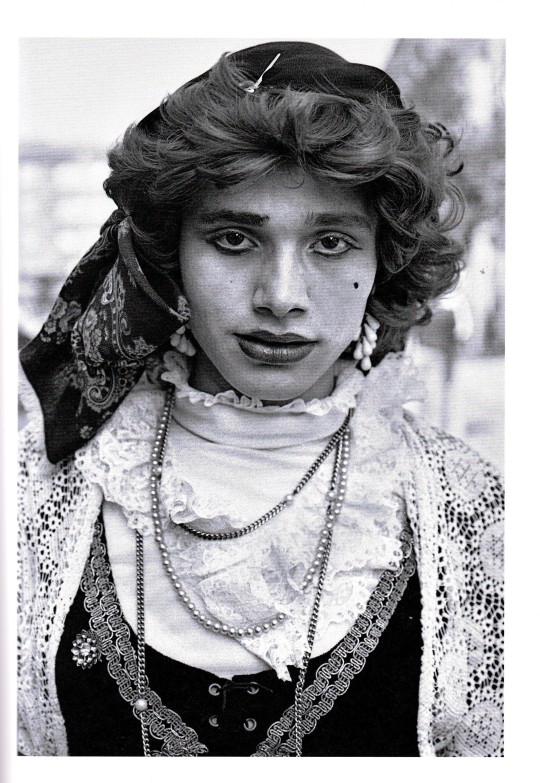
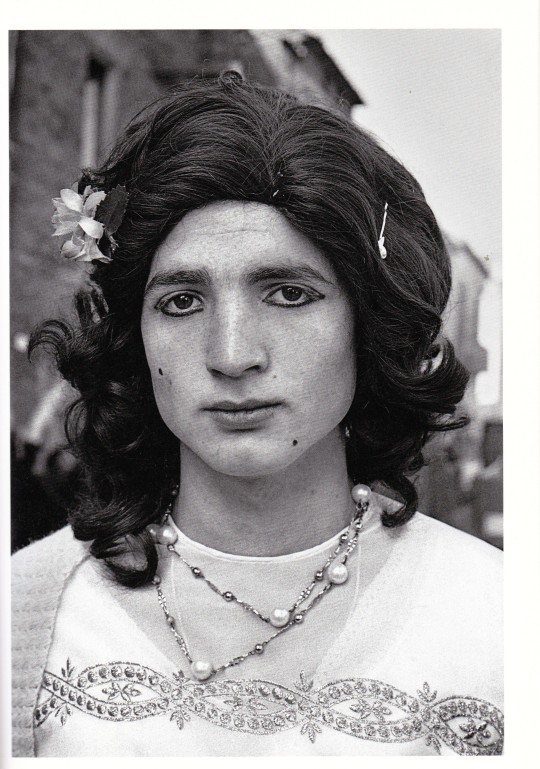

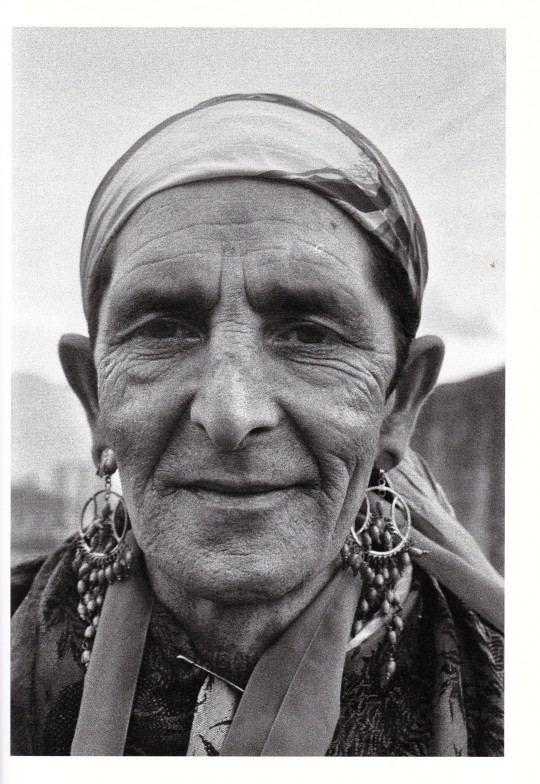

Travestimento
Marialba Russo
Postcart, Roma 2016, 84 pagine, fotografie in b/n, 21 x 31 cm, ISBN 9788898391493
euro 35,00
email if you want to buy [email protected]
Marialba Russo, tra il 1975 e il 1980, realizza una serie di ritratti nell’ambito della cultura del travestimento in Campania, in cui l’antropologia culturale dialoga con il progetto artistico.
“Uomini abbigliati e truccati da donna, per i quali travestirsi vale un po’ come spogliarsi: è un modo di liberarsi dal consueto e dal quotidiano, di spingersi oltre le colonne d’Ercole del genere e della categoria. Un modo che, seppur vissuto inconsciamente e nell’ambito di una festa carnevalesca di oggi, affonda le sue radici in una selva di antichi miti e di riti transculturali che avevano lo scopo di riconnettere gli opposti. coincidentia oppositorum qui significa far riaffiorare sulla superficie del corpo e della comunità le possibilità di un dialogo effettivo tra le polarità di maschile e femminile, ritualità magica per favorire la fertilità ed esorcizzare la morte; sono coincidenze che travalicano i confini geografici e che si riflettono in una modalità operativa arcaica per cui il superamento del genere sessuale, che rivive oggi nel travestitismo uomo-donna di sagre e carnevali di questo tipo, porta in sé la memoria segreta di remoti riti propiziatori e apotropaici che avevano la funzione di connettere con il sacro, il divino e il magico.”
06/04/23
orders to: [email protected]
ordini a: [email protected]
twitter: @fashionbooksmi
instagram: fashionbooksmilano, designbooksmilano tumblr: fashionbooksmilano, designbooksmilano
#Marialba Russo#travestimento#1975-1980#photography books#libri fotografia#campania#fashionbooksmilano
3 notes
·
View notes
Text
DIALOGO DI UN CONTASTORIE E DI UN FOLLE PASSEGGERE
Coincidentia oppositorum,
mio caro Nicolò da Cusa?
Chi sei tu?
Quello vero e autentico,
quello fresco di giornata come le uova di Paolo in Avola,
non quello dell’Università ad alto costo e a basso rischio,
non quello dell’Università che salda con i saldi di lauree,
a votre plaisir,
a volontè,
come la maionese che abbonda
nel camioncino sgangherato e odoroso di Ferruccio e di Ivana,
quelli che in…

View On WordPress
#Avola#Carnia#contastorie#Coraggiosetti#Cusano#dotta#fede#Ferruccio#filosofia#Giuseppina#ignoranza#instagram#Ivana#Mamo#passeggere#ragione#università#Vincenzo
0 notes
Text
ÚVAHA PĚTI STÁ OSMÁ - VYVÁŽENOST SVĚTA
Nacházíme se ve vesmíru, který je velice jemně vyladěn. Gravitační síly jsou přesně tak silné, aby se vesmír po velkém třesku okamžitě nerozletěl do nenávratna nebo naopak se nezhroutil do černé díry. Součástí kosmického prachu je přesně ten správný podíl uhlíku, aby mohl ve vesmíru vzniknout život. Vesmír prochází neustálými změnami, rozpíná se, rodí se a zanikají nové hvězdy. Jeho části jsou poměrně pravidelně rozprostřené v časoprostoru. Střídá se období klidu a vzruchu, erupcí a stability. Aby zůstal vesmír jako celek vyvážený musí být někde klid a jinde neklid.
Totéž platí i pro náš pozemský svět zabydlený lidmi. Tak, aby někdo mohl být šťastný, musí být někdo nešťastný. Tak, aby někde mohl být mír, musí být někde válka. Žijeme ve světě protichůdně působících sil, které vytváří jednotně vyvážený celek. Vnímání tohoto celku není člověku umožněno, protože se pohybuje pouze ve svém subjektivně vnímaném světě, ve kterém je buď šťastný nebo nešťastný, podle toho, v jakém silovém poli protichůdných sil se nachází. Život člověka neprobíhá ve vzduchoprázdnu, ale v určitém prostředí, které na něho vyvíjí pozitivní nebo negativní síly. Samotný jeho zrod je výsledkem sloučením protikladů mužského a ženského principu. Dvou antagonistických sil, které se musely spojit k vytvoření další živé bytosti. Tyto síly podléhají přírodnímu a Božímu zákonu – coincidentia oppositorum.
Možná platí jakýsi zákon přitažlivosti, kde protiklady se přitahují jako pozitivní a negativní póly. Dobří lidé přitahují zlo a ti zlí zase dobro, aby vyváženosti světa a sloučení protikladů bylo učiněno za dost. Na základě tohoto předpokladu proto vidíme mnoho zlých lidí, kteří se mají dobře, a naopak těch dobrých kteří strádají. Skoro vůbec neplatí staré rčení, že Boží mlýny melou pomalu, ale jistě. Lidé neblahé pověsti se dožívají vysokého věku, zatím co ti slušní často umírají dříve. Patrně to bude tím, že ty první jsou za jedno se zlem a když na ně zaútočí, tak jsou vůči němu imunní. Zatím co ti druzí nemají dost protilátek proti zlu a jsou jím zničeni. Zlí lidé jsou většinou hrubšího zrna a to, že páchají zlo si nepřipouští, dokonce si to často ani neuvědomují. Dobří lidé jsou křehčí povahy, věci si moc připouští a nejsou dostatečně vybavení bojovat se zlem, které neutočí přímo, ale nečekaně ze skrytu.
Ve skutečnosti většina lidí není pouze ďábelsky zlých, nebo andělsky dobrých. Lidé mají v sobě jak dobré, tak i zlé stránky a závisí v jakých souvislostech se nachází. Podle toho vystupuje buď jedna nebo ta druhá. Kdyby všichni lidé byli v jednom okamžiku pouze zlí, nebo naopak dobří, tak by se zhroutila rovnováha světa postavená na sloučení protikladů. Na tuto skutečnost upozorňuje C. G. Jung, když říká, že v našich životech se musíme naučit žít jak s Bohem, tak i ďáblem. Ďábel je často součástí našeho neznámého a nepředvídatelného jak osobního, tak i kolektivního nevědomí.
Idealisticky uvažující člověk se domnívá, že většina lidí má potřebu žít v harmonii jak se se sebou, tak i svým okolím a nepáchat zlo. Není tomu tak. Mnoho lidí myslí a jedná na úkor ostatních, přesně podle Darwinovy evoluční teorie, kde silnější požírá ty slabší. Z tohoto hlediska tygr, který ovládá své území není zlý, ale jedná pouze podle jemu daných přírodních zákonů. Převedeno na lidi současný politik nebo podnikatel ovládá a často i terorizuje své území na základě práva silnějšího, nebo spíše v dnešní úlisné době mazanějšího a bezcharakternějšího.
Nedělá vlastně nic zlého, pouze jedná podle přírodních zákonů.
Celá tato myšlenková konstrukce naráží na jednu zásadní věc. Na rozdíl od tygra, který má své omezené vědomí, má člověk vědomí sebe a s ním i související svědomí. Je si vědom toho, co dělá a je za své činy odpovědný ostatním lidem a svému okolí. Je pravda, že mnoho dravých lidí nemá čas zamýšlet se nad tím komu svým myšlením a jednáním škodí, ale svědomí je nedílnou součástí jejich duševní výbavy, pokud jsou si vědomi sebe. Mohou je mít potlačené, nebo zakrnělé, ale každý člověk ve vědomém stavu musí mít své svědomí.
Špatné svědomí se moc dlouho nedá potlačovat a často se projeví v podobě psychických a následně i fyzických zdravotních potížích. Člověk s hryzajícím špatným svědomím je zahnán do kouta a o to intenzivněji ubližuje jak svému okolí, tak i sobě. Takových lidí na různých úrovních společenského žebříku vídáme čím dál tím více. Je to dáno bezskrupulózní pragmatickou dobou a konzumní společností, která se ztrátou víra v Boha ztratila i víru v morálku, to, co nás sebevědomé lidi odlišuje od pouze vědomých zvířat. Boží a etické zákony jedno jsou!
Naším jednáním výrazně narušujeme rovnováhu naší malé planety až na hranici jejího zničení. Zánik naší planety a život na ní, však v žádném případě nemůže narušit vesmírnou rovnováhu. Je možné, že další život vznikne na nové planetě bez sebevědomých lidí a bude obývána „pouze“ vědomými zvířaty.
0 notes
Text
Asking if someone believes in god or not reveals nothing about if they actually believe in god or not; it only reveals which side of their brain currently holds more influence over what they are saying.
Left brain rejects god; right brain accepts god. Left brain builds walls, separating everything; right brain builds bridges, uniting everything. Left brain is exclusive, and right brain is inclusive.
So you are a living contradiction, a coincidentia oppositorum.
If you want to be a good atheist, become a theist. If you want to be a good theist, become an atheist. Atheism taken to its ultimate conclusion is theism; theism taken to its ultimate conclusion is atheism. This is the way of all things.
0 notes
Text
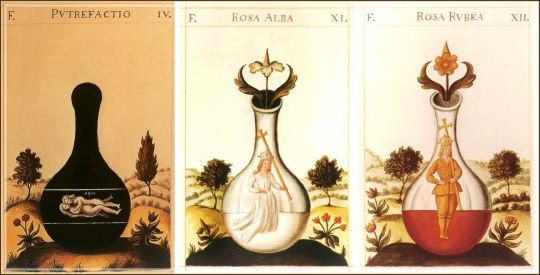
The three phases of the magnum opus: nigredo, albedo and rubedo. (from Pretiosissimum Donum Dei, published by Georges Aurach in 1475)
In alchemy, albedo, or leucosis, is the second of the four major stages of the Magnum Opus, along with nigredo, citrinitas and rubedo.[1] It is a Latinicized term meaning "whiteness". Following the chaos or massa confusa of the nigredo stage, the alchemist undertakes a purification in albedo, which is literally referred to as ablutio – the washing away of impurities. This phase is concerned with "bringing light and clarity to the prima materia (the First Matter)".[2]
In this process, the subject is divided into two opposing principles to be later coagulated to form a unity of opposites or coincidentia oppositorum during rubedo.[3] Alchemists also applied it to an individual's soul after the first phase is completed, which entailed the decay of matter.[4] In Medieval literature, which developed an intricate system of images and symbols for alchemy, the dove often represented this stage, while the raven symbolized nigredo.[5]
Titus Burckhardt interprets the albedo as the end of the lesser work, corresponding to a spiritualization of the body. Claiming the goal of this portion of the process is to regain the original purity and receptivity of the soul.[6]
Psychology[edit]
Psychologist Carl Jung equated the albedo with unconscious contrasexual soul images; the anima in men and animus in women. It is a phase where insight into shadow projections are realized, and inflated ego and unneeded conceptualizations are removed from the psyche.[citation needed] Another interpretation describes albedo as an experience of awakening and involves a shift in consciousness where the world becomes more than just an individual's ego, his family, or country.[7]
0 notes
Text
L'ANGELO DELL'ABISSO: APOLLO E LA LINEA SACRA MICHELITA
L'ANGELO DELL'ABISSO: APOLLO E LA LINEA SACRA MICHELITA
Videoconferenza del canale YouTube AXIS MUNDI, trasmesso in diretta streaming live il 6 aprile 2022.
“Quale ruolo storico, quale visione del mondo e concezione del cosmo ebbero coloro che gli auctores classici definirono «iatromanti», sciamani ed estatici adepti del dio iperboreo Apollo, maestro della coincidentia oppositorum e ispiratore della «follia divina» e dell’arte della mantica? Perché…
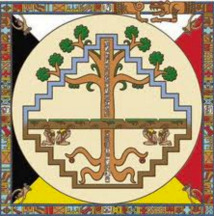
View On WordPress
0 notes
Photo
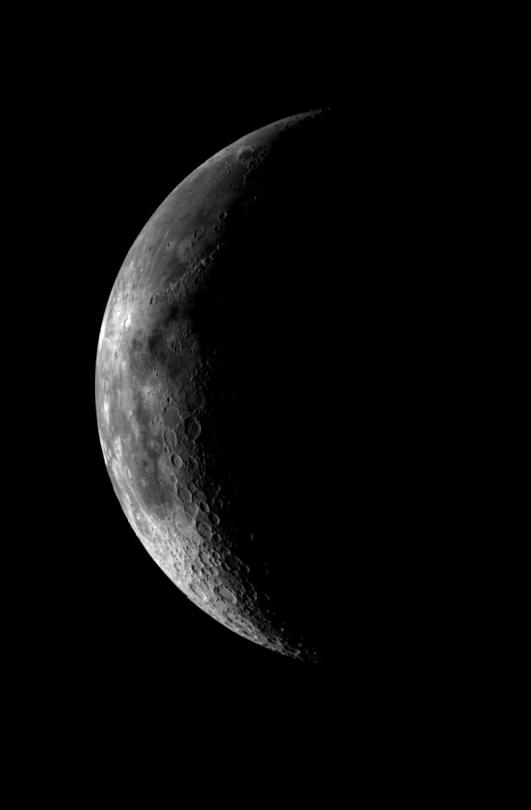
“It was lunar symbolism that enabled man to relate and connect such heterogeneous things as: birth, becoming, death, and ressurection; the waters, plants, woman, fecundity, and immortality; the cosmic darkness, prenatal existence, and life after death, followed by the rebirth of the lunar type ("light coming out of darkness"); weaving, the symbol of the "thread of life," fate, temporality, and death; and yet others. In general most of the ideas of cycle, dualism, polarity, opposition, conflict, but also of reconciliation of contraries, of coincidentia oppositorum, were either discovered or clarified by virtue of lunar symbolism. We may even speak of a metaphysics of the moon, in the sense of a consistent system of "truths" relating to the mode of being peculiar to living creatures, to everything in the cosmos that shares in life, that is, in becoming, growth and waning, death and resurrection.”
Quote by Mircea Eliade
0 notes
Quote
Dogmatism reveals itself not only by its inability to conceive the inward or implicit illimitability of the symbol, the universality that resolves all outward oppositions, but also by its inability to recognize, when faced with two apparently contradictory truths, the inward connection that they implicitly affirm, a connection that makes of them complementary aspects of one and the same truth.
Frithjof Schuon, The Transcendent Unity of Religions
#quote#Frithjof Schuon#Schuon#religion#philosophy#theology#universality#metaphysics#Perennialism#Sufism#dogma#dogmatism#truth#coincidentia oppositorum#esotericism#exotericisim
86 notes
·
View notes
Text
Coincidentia Oppositorum
I wish I knew just where to start
To speak my mind and hear my heart
To know what's true and what went wrong
To seek anew a healing song
The world it led me to your door
A streak of luck and nothing more
Unfurled its wings with me astride
I stood awestruck before my bride
So why does she turn me away
As if her night were not my day?
She says that we aren't meant to be
Where is her sight, why can't she see?
That what is writ upon the page
Will come to pass here on this stage
The most that we could hope to change
Is that this ought not seem so strange
We both have sought and thus are found
Now hand in hand let's stand our ground
Our fate thus wrought, our souls so bound
Await with baited breath, the sound
The music of our love, the beat
Of hearts that are, through love, complete
This artistry is so replete
With grace with which we can't compete
To part ways here would be bizarre
Is this of fear, or for the best?
Both avatars of bone and star
We are with breath made manifest
Necessity or potency?
The seed crystal has taken root
Is this arete or just techne?
Let us distill the secret route:
For the two and the one, they are one and the same
Like the moon and the sun share their light not their name
At first a line, and then a square, now round it out, we're nearly there
What's one is two, is freed by four; the moon is filled with gold I'm sure
The Phoenix burns, the eagle soars
Effect, so meek, follows its cause
A synthesis awaits us now
This impetus belongs to Tao
What halts the flow from down below?
That fount from which all things must spring
The light which set the stars aglow
The sight and sound of words which sing
The song that life to us did bring
So lyrical, how did it go?
The poet's soul has taken wing
His melody, now an echo
A mountaintop without a flame
A storm without its wind and rain
A form without a given name
A board without a chosen game
All these are half and yet not whole
And thus cannot bespeak our goal
To turn to gold this leaden coal
To see anew this world of old
And so see through the stories told
To grasp the Truth beyond the fold
The light of day begins to wane
Is this the way we know we're sane?
When black and white are drawn apart
The whole is sought by each in vain
'Til we can imitate our art
Around the twist we'll go again
#insinqronous poetry#originals#original#literature#spilled ink#spilled thoughts#midnight thoughts#poet#poetry#poets of tumblr#poets on tumblr#words#poem#opposites#black#white#black and white#union of opposites#coincidentia oppositorum
19 notes
·
View notes
Text
Planet Coincidentia Oppositorum
Opposite gender or location wager
Planet Coincidentia Likeness
Planet matches
Humanoidbiped gender application
2 notes
·
View notes
Text
“The view that we can simply turn our back on evil and in this way eschew it belongs to the long list of antiquated naïveties. This is sheer ostrich policy and does not affect the reality of evil in the slightest. Evil is the necessary opposite of good, without which there would be no good either. It is impossible even to think evil out of existence.”
Excerpt From: Jung, C. G., Hull, R. F.C., Adler, Gerhard. “Collected Works of C.G. Jung, Volume 9 (Part 1): Archetypes and the Collective Unconscious”.
3 notes
·
View notes
Text



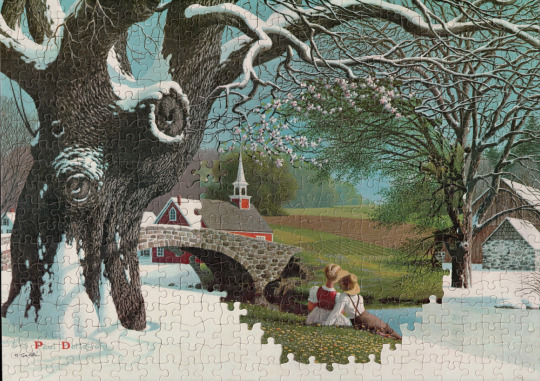
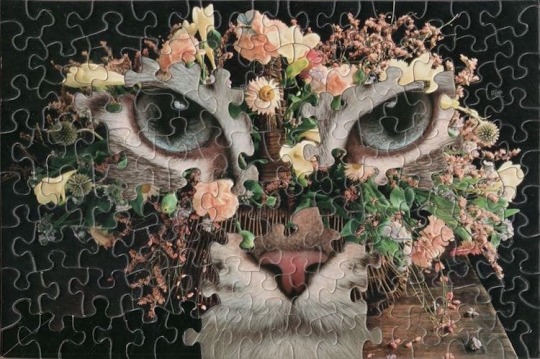
Coincidentia oppositorum: the union of opposites
#reconciling opposites#theory unification#Coincidentia oppositorum#Jung#CG Jung#what gets left out?#loose ends#isomorphic#isomorphism
38 notes
·
View notes